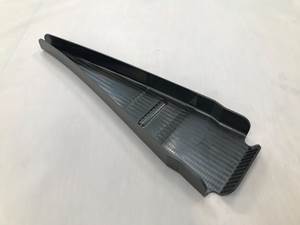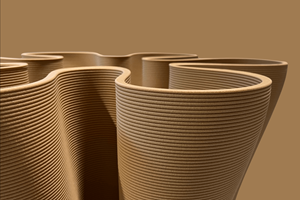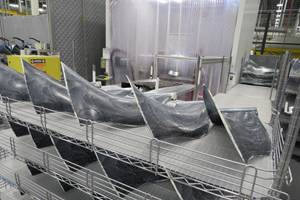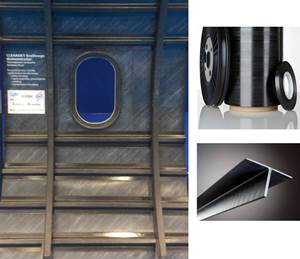Lilium, Toray reach carbon fiber supply agreement
Toray will provide carbon fiber directly to Lilium during development of the Lilium Jet eVTOL craft, and then to suppliers during prototyping and production. Includes video of Lilium Jet test flight.
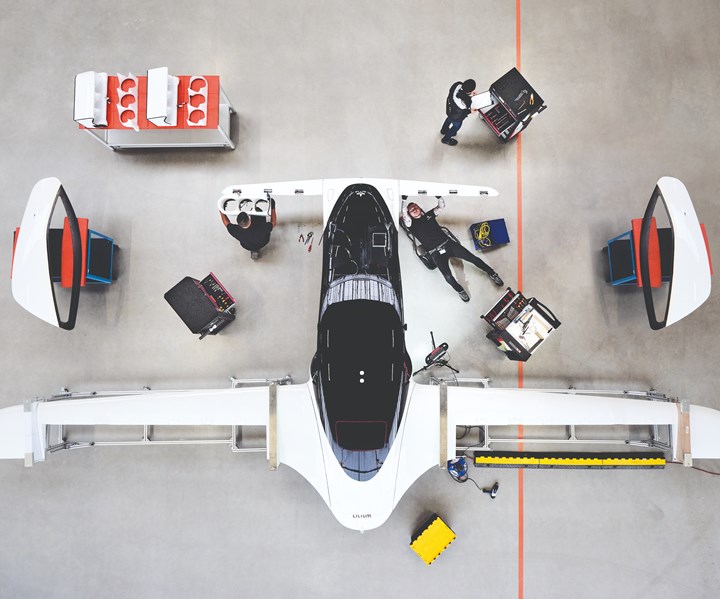
Lilium Jet assembly. Source | Lilium
Lilium (Munich, Germany), an aerospace company developing the Lilium Jet eVTOL craft, announced on Juy 13 that it has reached agreement with carbon fiber manufacturer Toray Industries (Tokyo, Japan) whereby Toray will supply high-performance carbon fibers to Lilium for manufacture of composite parts and structures.
The Lilium Jet is a five-seat, all-electric, emissions-free aircraft that can take off and land vertically and is designed to provide high-speed regional connections of up to 300 kilometers in less than 60 minutes. The aircraft’s primary structures, such as the fuselage, wings and flaps will all be made from carbon fiber composites using Toray materials.
“Securing this supply agreement marks an important step in the maturity of our supply chain and in our preparations for serial production,” says Daniel Wiegand, co-founder and CEO of Lilium.
Lilium says Toray will supply carbon fiber directly to Lilium initially for use in the production of additional technology demonstrators. When the Lilium Jet enters prototyping and production, Toray will deliver carbon fiber to suppliers who will manufacture parts for Lilium.
The agreement also paves the way for further collaboration between the two companies, both in the provision of other high-performance materials and the establishment of research and development partnerships.
Commenting on the partnership, Yves Yemsi, chief program officer at Lilium, says, “Toray’s wealth of experience in the world of high-performance carbon fibers and composite materials speaks for itself and we’re proud to be counted amongst the aerospace companies they supply.
“We look forward to developing a close collaboration with Toray in the years ahead and to building a resilient and agile supply chain for the Lilium Jet, together with other well-established and reliable aerospace suppliers across different fields of technology.”
Discussing the partnership, Minoru Yoshinaga, Toray SVP, GM of Torayca and Composites Division, says, “We are pleased to be selected as a partner by Lilium, one of the most promising companies in this emerging market sector. We look forward to working with Lilium to solve the environmental issues in urban areas, contributing by the power of materials.”
Lilium’s vision of air mobility encompasses a network of vertiports spread across an entire region, providing high-speed, point-to-point routes. Each additional vertiport added to the network would connect directly with all others within a 300-kilometer radius, leading to a fast scaling network that can provide regional connectivity at a fraction of the cost of traditional infrastructure such as high-speed trains. Lilium expects commercial operations to commence in 2025.
News of the partnership with Toray comes just weeks after Lilium confirmed it had welcomed Baillie Gifford (Edinburgh, Scotland), Tesla’s largest shareholder, as a new investor, bringing total funds raised to date to more than $375 million. The fresh funding will support the further development of the Lilium Jet as well as underpinning preparations for serial production in Lilium’s newly completed manufacturing facilities. It places Lilium amongst the top 20 most valuable startups in Germany.
Lilium says that a December 2018 study from Morgan Stanley forecasts that the eVTOL market could be worth as much as $1.5 trillion by 2040, with $851 billion of that coming from the passenger market that Lilium targets.
Related Content
ASCEND program update: Designing next-gen, high-rate auto and aerospace composites
GKN Aerospace, McLaren Automotive and U.K.-based partners share goals and progress aiming at high-rate, Industry 4.0-enabled, sustainable materials and processes.
Read MoreSulapac introduces Sulapac Flow 1.7 to replace PLA, ABS and PP in FDM, FGF
Available as filament and granules for extrusion, new wood composite matches properties yet is compostable, eliminates microplastics and reduces carbon footprint.
Read MorePlant tour: Albany Engineered Composites, Rochester, N.H., U.S.
Efficient, high-quality, well-controlled composites manufacturing at volume is the mantra for this 3D weaving specialist.
Read MorePEEK vs. PEKK vs. PAEK and continuous compression molding
Suppliers of thermoplastics and carbon fiber chime in regarding PEEK vs. PEKK, and now PAEK, as well as in-situ consolidation — the supply chain for thermoplastic tape composites continues to evolve.
Read MoreRead Next
“Structured air” TPS safeguards composite structures
Powered by an 85% air/15% pure polyimide aerogel, Blueshift’s novel material system protects structures during transient thermal events from -200°C to beyond 2400°C for rockets, battery boxes and more.
Read MoreVIDEO: High-volume processing for fiberglass components
Cannon Ergos, a company specializing in high-ton presses and equipment for composites fabrication and plastics processing, displayed automotive and industrial components at CAMX 2024.
Read MorePlant tour: Daher Shap’in TechCenter and composites production plant, Saint-Aignan-de-Grandlieu, France
Co-located R&D and production advance OOA thermosets, thermoplastics, welding, recycling and digital technologies for faster processing and certification of lighter, more sustainable composites.
Read More


















.jpg;maxWidth=300;quality=90)
